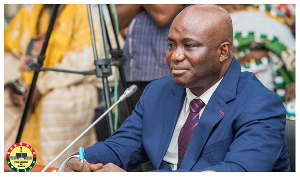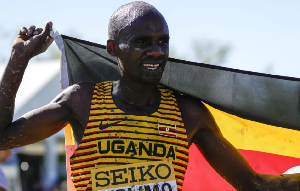Gulf Stream Deal -The Full Story
The Ministry of Defence may finally have its press conference Thursday at noon. But, The Statesman has undertaken its own inquiries to throw more light of substance onto the deal involving the controversial Presidential jet, Gulf Stream III.You may agree or disagree with the 2001 decision of the New Patriotic Party government not to use the Gulf Stream III. But, the value of the plane could have fallen as low as $46,000, according to one valuation, if the decision to sell it was not taken before May 15, 2006.
The fact is that the aircraft had fallen into a state of disrepair, the fixing of which would have set the country back another $4 million, according to an estimate provided by Gulf Stream consultants, Whispern Wings.
What we have found is that the plane has been disposed off by the country. Contrary to the arguments being spewed out by the opposition, since the disposal of an asset does not involve a charge on the consolidated fund, the government was right to sell the plane without taking it to Parliament.
In fact, the disposal of the aircraft can be compared to a government agency or ministry deciding to put its used vehicles up for auction. It requires no prior Parliamentary approval.
But, the sale agreement between the Ministry of Defence and the China National Aero-Technology Import & Export Corporation is somewhat linked to the acquisition of four brand new jet fighters and an accompanying simulator which the Air Force has negotiated for with the same Chinese firm.
On May 11, the agreement was signed between the two parties, with Air Commodore Issifu Sakib Kadri, signing for the Ministry. That agreement recognises that the two parties ?are desirous of entering into a Purchase Agreement?which is yet to be executed by the Parties and ratified by the Parliament of the [Ghana].?
The proposed terms are that the Chinese firm, CACTIC, has agreed to accept the Gulf Stream as ?part-payment of the total purchase price for the four K-8 Trainers and one K-8 flight simulator.?
The parties agreed that the value of the Gulf Stream shall be $5 million. By the agreement the cost of moving the aircraft out of Ghana for repairs was borne by the purchaser.
The question may be asked: Why would the Chinese agree to pay $5 million for a 20-year-old aircraft, which even in good condition, can be expected to fetch at best $7 million. Yet may carry a repair price tag of $4m?
The answer is in the 11th May agreement. Clause 5 (c) states: ?If the Second Party [Ministry of Defence] fails to execute the Purchase Agreement on or before the 31st day of July 2006, First Party [CACTIC] shall pay to Second Party the difference between the market value of the GIII and the cost incurred by the First Party in repairing the GIII??
Thus, if Parliament refuses to ratify the agreement yet to be brought before it for the Air Force?s acquisition of the four K-8 jets and simulator, Ghana will then end up with very little for the controversial aircraft, which cost in excess of $23 million.
Part-exchange deals come with profit, which allows a party like the Chinese to be more flexible. But failing the K-8 contract, Ghana may end up with next to nothing on the GIII.
But, a source close to the Air Force told The Statesman that the deal for the four jet fighters and a simulator is ?excellent? and as ?a necessity for the armed forces for national security. Parliament would be hard-pressed to not approve it.?
K-8 or Karakorum 8, which can be armed with air-to-air missiles are being traded for as much as $20 million each. An industry source assures The Statesman that deals are done on one-on-one basis and in Ghana?s case the four aircrafts and simulator could be as low as $40 million in total.
But, if that K-8 deal is not concluded by 31st July 2006, the Chinese are free to deduct all repairing costs and ?administrative costs?, referring to repair of discrepant parts and ferry flight from Accra to the repair facility. Ferry flight could be as high as $210,000.
The plane before leaving Accra, was valued by Air Force consultants at around $1 million in that prevailing state of disrepair. The very amount one consultant demanded in advance if they were to move the GIII from Accra for repairs. That evaluation was done in March, 2006.
Attempts by March to sell the plane drew a blank. According to Norman Rea, a foreign consultant to the Air Force, ?I was able to find absolutely no interest in the aircraft in its present state. Having been parked in a tropical, marine environment for five years, everyone is cautious of the corrosion state of the aircraft.?
Our additional information is that over $1 million ought to be spent extra for the plane to have a Hush Kit fitted, which would let it qualify for the noise level in the United States.
Mr Rea, the consultant, continues in an email to his client, stating dishearteningly, ?If these aspects were acceptable I would expect offers somewhat below US$1 million.?
Government, it appears was ready to cut its losses and run. Mr Rea?s March email stresses, ?Fixed and ready, to fly the aircraft is worth about $6.5M (assuming new paint, interior and engines). The project could possibly be completed for $4M if you paid $1M for the aircraft. To begin with, this leaves just $1.5M possible profit for a large investment in time and money [to repair]. This is not attractive enough to lure the right folks to the deal.? The consultancy, our sources say, cost the Air Force not more than $60,000, contrary to suggestions of $300,000.
The better option, perhaps, would have been to operate the Gulf Stream III. But, that goes against the commitment made to the country even before the NPP was voted into power.
The question that Government needs to answer is this: Did the aircraft have to end up in such a state of disrepair?
This question may only be adequately answered by the soundness of the contract for the K-8 jet trainers, the details of which are yet to come before Parliament.
















